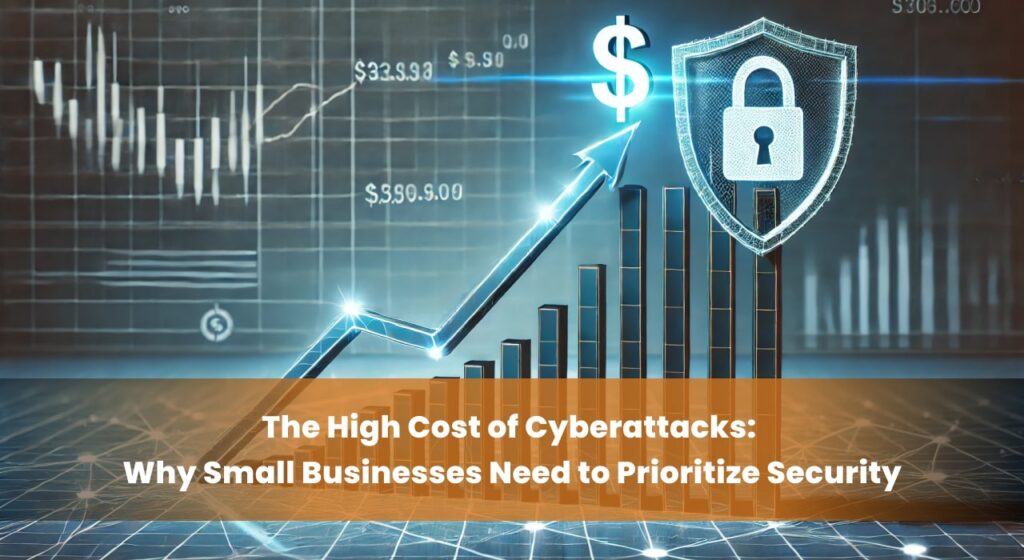
Cybersecurity for UAE SMBs
Cybersecurity, the discipline of safeguarding digital assets from illicit access, use, disclosure, disruption, modification or destruction, has ascended to a paramount position in contemporary organizational management. As the digital landscape expands and deepens its influence, the potential ramifications of a cyberattack have grown exponentially. While large corporations often possess dedicated resources to fortify their digital defenses, small businesses remain particularly vulnerable.
A recent study by IBM and Ponemon Institute revealed that the average cost of a data breach for small and medium-sized enterprises (SMEs) is significantly higher than for larger organizations. This disparity underscores the severe consequences that cyberattacks can inflict on the sustainability and growth of small businesses. These attacks can lead to substantial financial losses, reputational damage, and operational disruptions, potentially jeopardizing a company’s survival.
The United Arab Emirates (UAE) has embarked on an ambitious journey to establish itself as a global digital hub. This digital transformation has precipitated a surge in economic activity, fostering innovation and entrepreneurship. However, this rapid digital evolution also presents heightened cybersecurity challenges. To ensure the continued growth and prosperity of the UAE’s digital economy, businesses of all sizes must prioritize robust cybersecurity measures.
This article will delve into the specific cybersecurity challenges confronting small businesses in the UAE. It will explore common threats, practical strategies to mitigate risks, and available resources to bolster defenses. By understanding these critical elements, businesses can enhance their cybersecurity posture and contribute to the overall resilience of the UAE’s digital ecosystem.
Why Cybersecurity Matters for Small Businesses in the UAE

The United Arab Emirates (UAE) is undergoing a remarkable digital metamorphosis. Fueled by ambitious government initiatives and a thriving entrepreneurial ecosystem, small businesses across the nation are embracing technology at an unprecedented rate. From streamlining operations to expanding customer reach and enhancing competitiveness, digital infrastructure has become an indispensable cornerstone for these ventures. However, this growing reliance on technology necessitates a concurrent focus on cybersecurity.
According to the Cybersecurity & Infrastructure Security Agency (CISA), a staggering 43% of all cyberattacks target small businesses. This vulnerability stems from several factors, including limited IT resources and potentially less robust security protocols compared to larger corporations. These attacks can manifest in various forms, each capable of inflicting significant damage:
- Phishing Attacks: Disguised as legitimate emails or messages, these attacks attempt to deceive unsuspecting users into revealing sensitive information like login credentials or financial details. A successful phishing attack can lead to a data breach, jeopardizing customer information and eroding trust in the business.
- Malware: This umbrella term encompasses a wide range of malicious software threats, including viruses, worms, and spyware. Malware can disrupt operations, steal sensitive data, or render systems inoperable, resulting in financial losses and operational downtime.
- Ransomware: This particularly insidious attack encrypts a victim’s data, effectively holding it hostage until a ransom is paid. Ransomware can cripple a business’s ability to function, leading to severe financial losses and potentially irreparable reputational damage.
The ramifications of cyberattacks extend far beyond immediate financial losses. A data breach can expose sensitive customer information, potentially inviting regulatory fines and a significant erosion of trust. Reputational damage can have a long-lasting impact, hindering a business’s ability to attract new customers and retain existing ones.
Understanding the evolving cybersecurity landscape and implementing appropriate measures is no longer a discretionary act; it’s an imperative for small businesses in the UAE. Fortunately, the nation has taken proactive steps to address these concerns. The UAE Federal Law No. 26 of 2012 Concerning the Use of Information Technology in the UAE establishes a legal framework for data privacy and security. By adhering to these regulations, businesses demonstrate their commitment to safeguarding sensitive information.
However, navigating the intricacies of cybersecurity can feel overwhelming for small businesses. To address this disparity, a variety of resources are accessible. Conducting a security gap analysis can identify vulnerabilities in a company’s defenses (consider services for a best cybersecurity solution for small businesses). Consulting with reputable cybersecurity services for small businesses can provide tailored solutions to address these gaps. Additionally, exploring free cybersecurity resources for small businesses offered by government agencies or industry organizations can equip entrepreneurs with the knowledge they need to mitigate risks.
By taking proactive measures to fortify their cybersecurity posture, small businesses in the UAE can confidently navigate the digital landscape. This not only fosters innovation within their own ventures but also contributes to the nation’s burgeoning digital economy.
The Cost of Cyberattacks for Small Businesses

Cyberattacks can inflict a devastating financial blow on small businesses, potentially jeopardizing their very survival. A study by the Ponemon Institute revealed that the average cost of a data breach for a small or medium-sized enterprise (SME) is a staggering sum. These costs encompass a multitude of factors, including:
- Direct remediation expenses: Repairing compromised systems, restoring lost data, and notifying affected individuals can incur significant costs.
- Investigative efforts: Identifying the source of the attack and understanding its scope necessitates a thorough investigation, involving IT professionals and potentially external forensic experts.
- Lost productivity: Cyberattacks can disrupt operations, leading to downtime and lost revenue.
- Regulatory fines: Failure to comply with data privacy regulations in the wake of a breach can result in substantial fines.
These financial ramifications can be particularly crippling for small businesses. Unlike larger corporations with robust financial reserves, a cyberattack can deplete a small business’ limited resources, hindering its ability to invest in growth and innovation.
Furthermore, the reputational damage associated with a data breach can erode customer trust. In today’s digital age, customers expect businesses to safeguard their personal information. A security lapse can lead to a loss of customer confidence, impacting sales and hindering long-term growth.
The financial and reputational consequences of cyberattacks underscore the importance of prioritizing cybersecurity for small businesses in the UAE. By investing in preventive measures and establishing robust security protocols, businesses can mitigate risks and safeguard their digital assets, ensuring their continued success in the digital economy.
Identifying Your Cybersecurity Risks
A security gap analysis is a comprehensive evaluation of an organization’s cybersecurity posture to identify vulnerabilities and potential threats. By understanding these weaknesses, businesses can prioritize their security efforts and allocate resources effectively. This proactive approach is essential to protect sensitive data, maintain operational continuity, and safeguard the company’s reputation.
A gap analysis helps businesses gain a clear understanding of their assets at risk. This entails identifying essential data, including customer information, financial records, intellectual property, and employee data. Once these assets are defined, the analysis focuses on assessing the security controls in place to protect them. This involves examining various aspects of the IT infrastructure, including network security, endpoint protection, access controls, data encryption, and employee training. By comparing the current security measures against industry best practices and regulatory requirements, businesses can pinpoint potential weaknesses in their security posture, such as outdated software, weak passwords, or insufficient employee awareness.
Conducting a basic security gap analysis can be a straightforward process. Start by creating an inventory of critical assets, followed by an assessment of existing security controls. Compare these controls to industry standards and identify any gaps or inconsistencies. This exercise will highlight areas where improvements are needed.
While conducting a thorough security gap analysis can be complex, several resources are available to assist small businesses. Numerous free online tools offer self-assessment questionnaires and checklists to help identify potential vulnerabilities. Additionally, consulting with cybersecurity professionals can provide expert guidance and support in conducting a comprehensive analysis. By investing time and resources in a security gap analysis, small businesses can significantly enhance their cybersecurity posture and reduce the risk of a costly cyberattack.
Implementing Effective Cybersecurity Measures

Implementing a robust cybersecurity framework is essential for safeguarding small businesses in the UAE. A combination of fundamental and advanced measures can significantly mitigate risks and protect sensitive information.
Basic Cybersecurity Measures
- Strong Password Policies: Enforcing the use of complex, unique passwords for each account is paramount. Regular password updates and the prohibition of password sharing are crucial.
- Employee Cybersecurity Awareness Training: Educating employees about common cyber threats, such as phishing and social engineering, can significantly reduce the risk of human error. Regular training sessions should be conducted to reinforce optimal practices.
- Regular Data Backups: Implementing a comprehensive data backup strategy is essential for business continuity. Regular backups should be stored securely off-site to safeguard against data loss due to cyberattacks or physical disasters.
- Firewalls and Antivirus Software: Deploying firewalls to monitor and control incoming and outgoing network traffic is crucial. Additionally, installing robust antivirus software on all devices helps protect against malware infections.
Intermediate Cybersecurity Measures
- Multi-Factor Authentication (MFA): Requiring multiple forms of verification for account access adds an extra layer of security. MFA can significantly deter unauthorized access attempts.
- Data Encryption: Encrypting sensitive data both at rest and in transit prevents unauthorized access even if data is compromised.
- Vulnerability Management Programs: Regularly scanning systems for vulnerabilities and patching them promptly is essential to prevent exploitation.
- Incident Response Planning: Developing a comprehensive incident response plan outlines steps to be taken in case of a cyberattack, minimizing damage and facilitating a swift recovery.
Cybersecurity Measures Summary
| Cybersecurity Measure | Description |
|---|---|
| Strong Password Policies | Enforcing complex, unique passwords to prevent unauthorized access. |
| Employee Cybersecurity Awareness Training | Educating employees about cyber threats and best practices. |
| Regular Data Backups | Protecting data from loss through regular backups. |
| Firewalls and Antivirus Software | Safeguarding networks and devices from malicious threats. |
| Multi-Factor Authentication | Adding an extra layer of security through multiple verification methods. |
| Data Encryption | Protecting sensitive data from unauthorized access. |
| Vulnerability Management Programs | Identifying and patching system vulnerabilities. |
| Incident Response Planning | Developing a plan for responding to cyberattacks. |
While these measures provide a strong foundation, it is crucial to recognize that cybersecurity is an ongoing process. Regularly updating software, patching vulnerabilities, and reviewing security policies are essential to maintain an effective defense against evolving threats. By investing in cybersecurity, small businesses can protect their valuable assets, build customer trust, and ensure long-term sustainability.
Remember that staying informed about the latest cyber threats and best practices is crucial. Consider subscribing to cybersecurity newsletters or attending industry conferences to stay updated on the evolving landscape.
Resources for Small Businesses in the UAE
Small businesses in the UAE can leverage a variety of resources to enhance their cybersecurity posture. The UAE government has initiated several programs to support businesses in this domain. Additionally, industry associations and cybersecurity companies offer valuable guidance and services.
For instance, the UAE Cyber Security Council provides essential information and resources. Collaborating with local cybersecurity firms specializing in cybersecurity services for small businesses can offer tailored solutions. Small businesses can also explore free cybersecurity resources available online or through government initiatives.
To accurately assess your business’s cybersecurity posture and receive practical recommendations, we recommend using advanced platforms like Cybernod.
Cybernod provides advanced cybersecurity assessment tools to help small businesses identify their weaknesses and take the necessary steps to improve security.
Remember to conduct thorough research and due diligence when selecting cybersecurity providers or resources.
By utilizing these resources, small businesses can protect their digital assets, build customer trust, and ensure long-term sustainability.
While this article provides a solid foundation for cybersecurity essentials, the digital landscape extends beyond your on-premise infrastructure. Many small businesses in the UAE leverage cloud-based solutions for storage, collaboration, and various business functions. Securing this cloud environment is crucial for safeguarding sensitive data and maintaining regulatory compliance.
To delve deeper into cloud security best practices specifically tailored for UAE businesses, check out our follow-up article: “Cloud Security Best Practices for Small Businesses“.
In conclusion, the digital landscape presents both opportunities and risks for small businesses in the UAE. Prioritizing cybersecurity is essential for mitigating these risks and ensuring sustainable growth. By conducting a security gap analysis and implementing appropriate cybersecurity measures, businesses can significantly reduce their vulnerability to cyberattacks. Investing in robust security solutions and staying informed about emerging threats are crucial steps to safeguarding sensitive data, maintaining customer trust, and achieving long-term success.
Remember, cybersecurity is an ongoing process. Regularly reviewing and updating security measures is vital to staying ahead of evolving threats.
Categorized in:
Comments